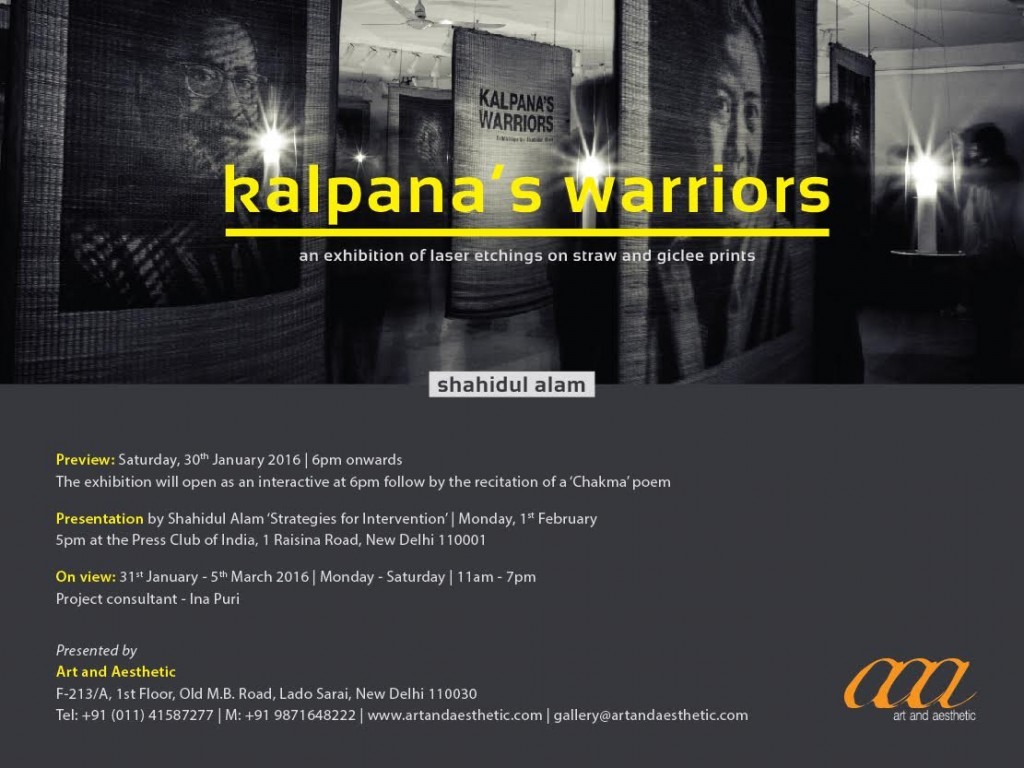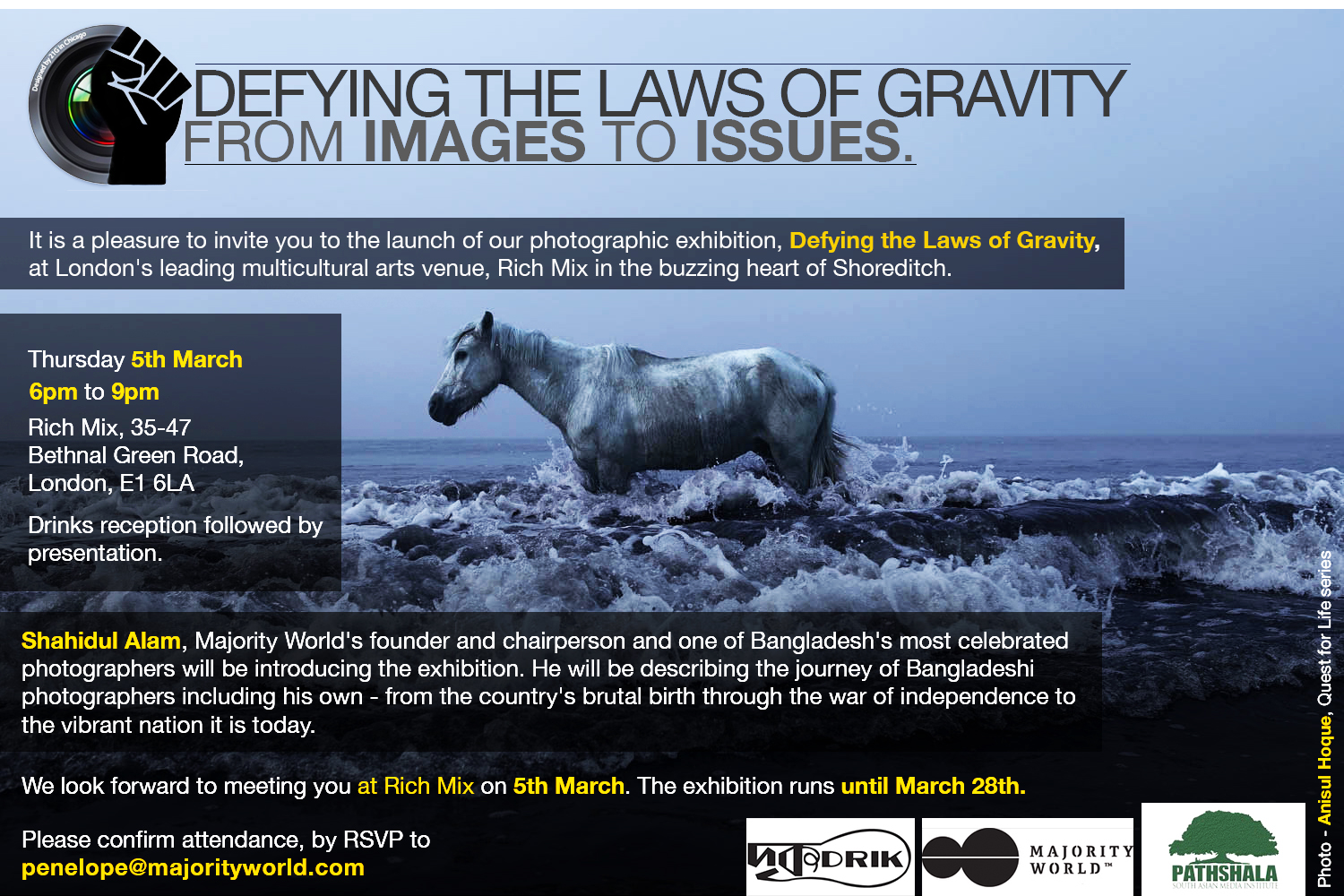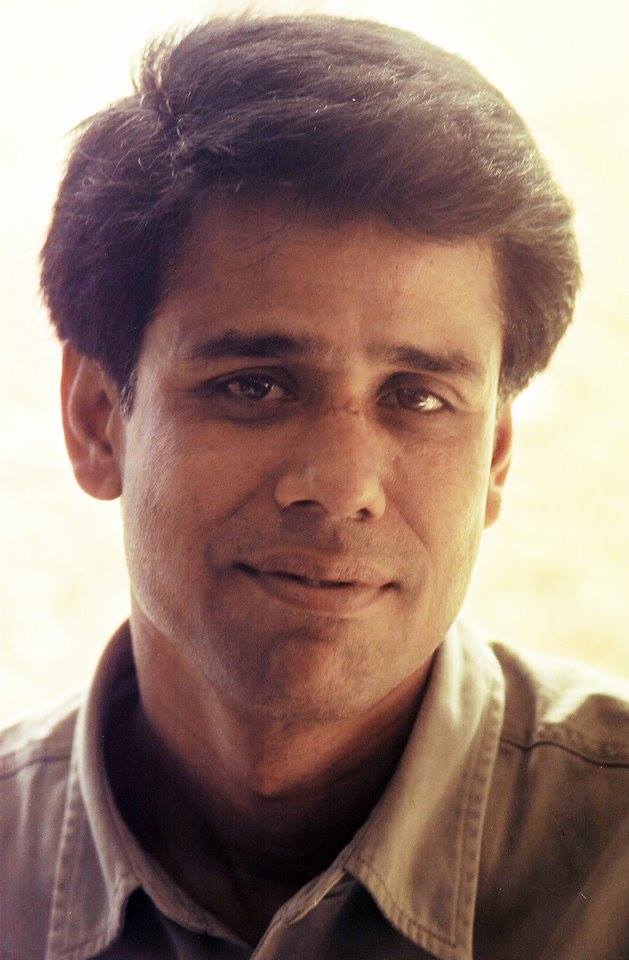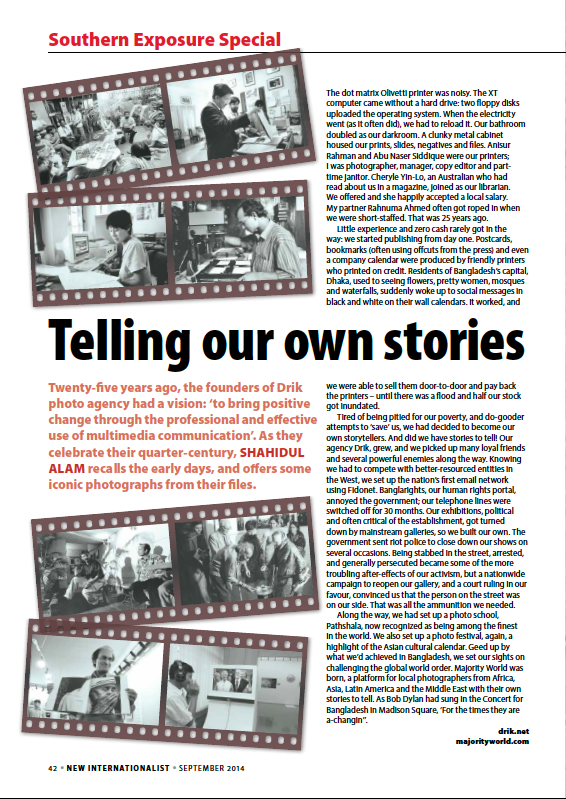
Kalpana Chakma, a young leader of the Bangladeshi Hill Women?s Federation, was abducted from her home by military personnel and civilian law enforcers at gunpoint on 12 June 1996. She remains missing. Through this work, part of Drik?s ?No More? campaign, photographer?Shahidul Alam?has tried to break a silence that successive governments, whether civilian or military backed, have carefully nurtured. The exhibition uses laser etching on straw mats, an innovative technique developed specifically for this exhibition. The process involved in creating these images is rooted to the everyday realities of the hill people, the paharis. Interviewees had repeatedly talked of the bareness of Kalpana?s home. That there was no furniture. That Kalpana slept on the floor on a straw mat. The straw mats were burned by a laser beam much as the fire that had engulfed the pahari villages.
Shilpakala Award recipient Shahidul Alam, set up Drik and Majority World agencies, Pathshala South Asian Media Institute and Chobi Mela festival. Honorary Fellow of the Royal Photography Society and visiting professor at Sunderland University. Alam has chaired the World Press Photo jury. Alam also introduced email to Bangladesh. His book my journey as a witness has been described as ?the most important book ever written by a photographer? by legendary picture editor of?Life Magazine, John Morris. He is an internationally acclaimed public speaker and has presented at Hollywood, National Geographic, re:publica, COP21 and POP Tech.
Reviews:
What’s Hot
Buzz in Town
Artslant
Blouinartinfo
Events High
The Statesman
Category: Education
HISTORY AS ETHICAL REMEMBRANCE
Dhaka University, Shaheed Minar and CP Gang’s ‘bessha’ banner
by Rahnuma Ahmed
![The online group CP Gang's banner reads (translated) 'Resist these so-called civil [society] liars and anti-Independence intellectual prostitutes in order to uphold the true history of the liberation war to the younger generation.' Those whose faces are crossed out are, from left to right, journalist Mahfuzullah, Dhaka University professors Asif Nazrul and Amena Mohsin, North South university professor Dilara Chowdhury, lawyer Tuhin Malik, writer and columnist Farhad Mazhar, Saptahik editor Golam Mortuza, New Age editor Nurul Kabir, and daily Manabzamin editor Motiur Rahman Chowdhury. A human chain at the Central Shaheed Minar organised by the Muktijoddha Sangsad Santan Command, Dhaka on October 17, 2014.](http://newagebd.net/wp-content/uploads/2015/11/0229.jpg)
THIS story begins with the sudden and unexpected death of professor Piash Karim on October 13, 2014, of cardiac arrest. Piash, who had returned to Dhaka in 2007 after teaching for nearly two decades at an American university, had joined BRAC University and was teaching in the department of economics and social sciences. Dr Amena Mohsin, professor of international relations at Dhaka University, and Piash Karim got married in March 2013; high-school student Drabir Karim, Piash’s son from his first marriage, was part of their family. Earlier known in his circle of friends for his left-leaning views, Piash gradually gravitated towards the Bangladesh Nationalist Party, a centrist party and the ruling Awami League’s arch-enemy. He began frequenting television talk shows, popular, as no real debate takes place in the parliament. (The popularity of TV talk shows has drastically declined, however, with the silent black-listing of dissident voices; a couple of analysts have reportedly left the country). His comment that the Ganajagaran Mancha, initially composed of a small group of bloggers and activists calling for the hanging of war criminals of 1971, later mushrooming into a sea of people at Shahbagh square in Dhaka city and spreading nationwide, was developing ‘fascist’ undertones, earned him widespread denunciation. The movement was then riding high. Continue reading “HISTORY AS ETHICAL REMEMBRANCE”
The Ruin of Indonesian Society
Indonesia: 50 Years After the Coup and the CIA Sponsored Terrorist Massacre. The Ruin of Indonesian Society

Last year, I stopped travelling to Indonesia. I simply did? I just could not bear being there, anymore. It was making me unwell. I felt psychologically and physically sick.
Indonesia has matured into perhaps the most corrupt country on Earth, and possibly into the most indoctrinated and compassionless place anywhere under the sun. Here, even the victims were not aware of their own conditions anymore. The victims felt shame, while the mass murderers were proudly bragging about all those horrendous killings and rapes they had committed. Genocidal cadres are all over the government. Continue reading “The Ruin of Indonesian Society”
Bentleys and Benefits

Bentleys and Benefits is a unique exhibition at?Rich Mix?capturing the story and social diversity of the East End through the eyes of the young people who live here. The exhibition brings together the outcomes of ?Demystifying Photography?, a series of photography workshops, by?Drik Picture Library, Dhaka in collaboration with?Rich Mix?and?Morpeth School.
Five workshops between October 2014 and June 2015 were conceived to offer the youth of East London an opportunity to work with?Shahidul Alam, founder of?Drik?and world-renowned photographer, writer and activist from Bangladesh, and learn how to use digital technology to capture a memorable image by using key elements of story telling. By exploring emotion and perspective, and studying qualitative shifts between first person and third person narratives,?Alam?introduces the often-neglected sphere of visual literacy.
The photographers, all sixth form students at?Morpeth school, have been working closely with?Alam, to develop their own voice through photography; resulting in an intimate, compassionate and inclusive dialogue shaped by their experiences of life in Bethnal Green. The result is a photographic journey through the financial and social landscape of this extraordinary area of London.
Photographers: Arshad Ali, Fahim Ali, Halima Khanom, Mohammad Nahid Zakaria, Mohammad Zackariyya Ullah, Zayn Ali, Yusuf Saib?(Morpeth school)
Workshop Leader:?Shahidul Alam?(Drik)
Text: Mohammad Zackariyya Ullah (Morpeth school), Mary George (Drik)
Flyer Design: Yusuf Saib?(Morpeth school)
Logo Design: Yusuf Saib?(Morpeth school)
Social Media: Halima Khanom, Mohammad Zackariyya Ullah, Arshad Ali?(Morpeth school)
Fundraising: Zayn Ali, Mohammad Nahid Zakaria (Morpeth school), Mary George (Drik)
Coordinators: Matthew Keil and Sam French (Morpeth school), Mary George (Drik)
Project Management: Saiful Islam (Drik)
Prints proudly supported by?theprintspace.



![]()
Faculty recruitment at Pathshala March 2015

Vacancy Announcement
Pathshala South Asian Media Institute invites applications for the post of Contractual (Part Time) Teachers (Job Title: Faculty member) to teach the short courses and workshops the institution offers (Basic Photography Course, Foundation Course, Digital Photography, Teen Photography etc.) under the supervision of Head of Photography/Academic Council/Faculty Moderator. The Faculty Member/s will be responsible for planning, organising and implementing an appropriate educational programme at Pathshala in a learning environment that guides and encourages students to develop and fulfill their academic potential along with delivering an innovative and inspirational educational module that will positively impact the students? learning. Teachers need to be competent in teaching photography techniques including camera exposures, digital photography and composition as well as the appropriate use of light and lens. Other responsibilities include establishing, developing and implementing the curriculum and course materials for each semester. Contributing to the development and co-ordination of a particular area of the curriculum; providing a variety of learning materials, designing projects, organising group sessions and other activities to enhance the learning experience; maintaining discipline in accordance with the rules of the institute; performing certain duties including student support, counseling students with academic problems and providing student encouragement by treating all students fairly within a professional relationship. The faculty member should also ensure that there is total confidentiality of all material used in the Pathshala courses and that there are no situations leading to a conflict of interest with competing institutions without prior managment approval. Preparing reports on one?s own activities with results against targets and suggestions will need to be presented in faculty meetings.
S/he should be holding a minimum graduate or higher degree with good spoken and written Bangla and English and have at least 2 years of working experiences in a related field along with teaching experience on relevant subjects or work experience as a professional. Knowledge of relevant technology is assumed. Job location is in Dhaka and salary is negotiable with other benefits as per organisational policy.
Interested candidate should apply with a CV and a recent photograph to recruitment@drik.net or hr@pathshala.netby March 24, 2015.
Or
Send at this address by ?mentioning the post? on the envelope:
To
Head of Human Resource Department
Pathshala South Asian Media Institute
16, Sukrabad, Panthapath, Dhaka-1207, Bangladesh.
www.pathshala.net
Job Offer at Pathshala
?

Vacancy Announcement
Pathshala South Asian Media Institute invites applications for the post of Head of Photography for the Photography Department who will be responsible for the overall strategy of the department under the supervision of the Principal. His/her responsibilities include assisting the principal in providing the overall leadership of Pathshala; setting goals for the Photography Department together with the principal, manage and lead the Photography Department in order to achieve these goals for the department and for Pathshala as a whole; developing curriculum for the Photography department of Pathshala South Asian Media Institute; guiding the team in the development and implementation of short and long-term courses, schedules and programme plans; evaluating performance and the effectiveness of training programmes, providing recommendations for improvement and developing testing evaluation procedures; representing the Photography department of Pathshala when and where necessary; keeping liaison with universities, funding & donor agencies, media institutes and other media organisations; taking classes as a regular faculty member; seeking out interesting ideas and innovations through information, knowledge management; promoting regional and international collaboration, team building and learning and bearing overall responsibility for designing short & long course and training programmes after consulting with the academic council. ? At the minimum, s/he should have a graduate degree with good spoken and written Bangla and English skills having at least 5 years of working experiences in a related field. Sound ability to deal with programme and project development would also be expected. Job location is in Dhaka and salary is negotiable with other benefits as per organisational policy. Interested candidate should apply with a CV and a recent photograph to recruitment@drik.net ?or hr@pathshala.net by March 24, 2015. Or Send at this address by ?mentioning the post? on the envelope: To Head of Human Resource Department Pathshala South Asian Media Institute 16, Sukrabad, Panthapath, Dhaka-1207, Bangladesh. www.pathshala.net
Pathshala is an equal opportunities employer.
16 Organizations that Want to Fund Your Photography Project
You have a powerful idea for a photography project, but not all the funds you need to make it happen. Sound familiar?
The great news is there are many foundations, non-profits and private companies alike, who are willing to fund worthy photographers based on talent and project goals. Some offer grants for photojournalists who expose social injustices; others focus on editorial photographers who tell long-form stories.
We?ve rounded up 16 as a start to help you in your search. It?s?by no means an exhaustive list, so feel free to add others to the list via the comments section!
Continue reading “16 Organizations that Want to Fund Your Photography Project”
Defying the Laws of Gravity
??????????????????????????????????? Photographers in Bangladesh 1987 -2014

It?s an unlikely mix. ?The powerful but sage Abir Abdullah,, the protesting activist Taslima Akhter, the quiet and reflective Sarker Protick, the agent provocateur Jannatul Mawa, the deep and other worldly Anisul Hoque, the disturbingly questioning Tushikur Rahman and the visionary Shahidul Alam. Collectively they shape one of the most powerful photographic movements of modern times. Continue reading “Defying the Laws of Gravity”
Chasing Windmills
AZIZUR RAHIM PEU, born 10th June 1964, died 14 October 2014

“If you let me go, I’ll kill myself.” I’d never given a job to anyone before. So this response to my suggestion that there was a better future for him elsewhere, was something I wasn’t prepared for. I had returned to Bangladesh after having been away for twelve years. Not having the capital myself, I had set up a photographic studio in partnership with a businessman cum photographer Khan Mohammad Ameer and his businessmen brothers. The studio ‘Fotoworld’ was posh, and we photographed the glitterati. We also took pictures of factories, the odd milk powder tin, food, cigarette cartons and pretty much anything people would pay us (and sometimes not pay us) to shoot. Azizur Rahim Peu was my first recruit. I’d come to know him through the Bangladesh Photographic Society, where I was the general secretary and had taken an immediate liking to the young man. Continue reading “Chasing Windmills”
Drik’s 25th Anniversary
The dot matrix Olivetti printer was noisy. The XT computer came without a hard drive: two floppy disks uploaded the operating system. When the electricity went (as it often did), we had to reload it. Our bathroom doubled as our darkroom. A clunky metal cabinet housed our prints, slides, negatives and files. Anisur Rahman and Abu Naser Siddique were our printers; I was photographer, manager, copy editor and part-time janitor. Cheryle Yin-Lo, an Australian who had read about us in a magazine, joined as our librarian. We offered and she happily accepted a local salary.

The New Internationalist Magazine in Oxford, has been a long time friend and supporter. This two page spread was put together by them to commemorate Drik’s 25th anniversary. Thanks NI. Continue reading “Drik’s 25th Anniversary”
